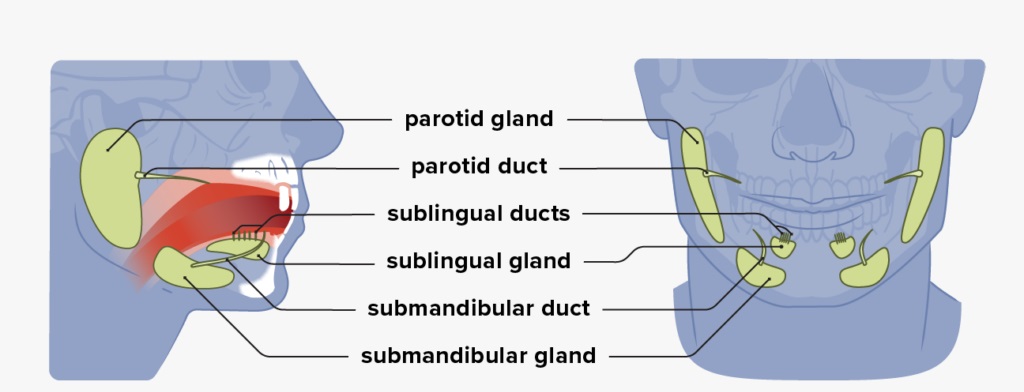
Salivary gland infections: Causes, types, symptoms, and treatment
Salivary gland diseases encompass a range of conditions that can affect one or more of the salivary glands in the mouth and throat. The human body has three major pairs of salivary glands: the parotid (near the jaw and in front of the ears), the submandibular (under the floor of the mouth), and the sublingual glands (under the tongue), along with hundreds of minor salivary glands lining the mouth and throat. These glands produce saliva, which aids in digestion, helps protect teeth from decay, and keeps the mouth moist. Salivary gland diseases can cause swelling, pain, and dysfunction in these glands, affecting saliva production and overall oral health.
Types of Salivary Gland Diseases
- Infections: Bacterial and viral infections can cause salivary gland inflammation (sialadenitis). Mumps is a well-known viral infection that primarily affects the parotid glands.
- Obstructive Diseases: Salivary stones (sialolithiasis) or strictures can block the flow of saliva, leading to pain and swelling, particularly during meals.
- Autoimmune Diseases: Conditions like Sjögren’s syndrome can cause dry mouth (xerostomia) and dry eyes (keratoconjunctivitis sicca) by attacking the body’s moisture-producing glands, including the salivary glands.
- Tumors: Both benign and malignant tumors can develop in the salivary glands. The majority of salivary gland tumors occur in the parotid gland and are usually benign.
- Cysts: Salivary gland cysts (mucoceles) are usually benign and result from the blockage of salivary ducts.
- Chronic Sialadenitis: Chronic inflammation of the salivary glands can lead to recurrent pain and swelling, often with no clear infection present.
Symptoms
Symptoms of salivary gland disease can vary depending on the underlying condition but may include:
- Swelling of one or more salivary glands
- Pain in the mouth, face, or neck
- Dry mouth
- Difficulty swallowing or opening the mouth
- Abnormal tastes, odors, or decreased taste sensation
- Pus or foul-tasting discharge in the mouth
Diagnosis
Diagnosing salivary gland diseases typically involves:
- Clinical Examination: Assessing symptoms and examining the head, neck, and oral cavity.
- Imaging Tests: Ultrasound, CT scans, and MRI can visualize stones, tumors, or other abnormalities within the salivary glands.
- Sialography: An imaging technique that involves injecting a dye into the salivary ducts to visualize blockages or damage.
- Fine Needle Aspiration (FNA) Biopsy: Used particularly for diagnosing tumors, where a small sample of tissue is extracted for pathological examination.
- Blood Tests: Useful in diagnosing autoimmune conditions like Sjögren’s syndrome.
Treatment
Treatment depends on the specific disease and its severity:
- Infections: Bacterial infections are treated with antibiotics, while viral infections are managed with supportive care.
- Obstructions: Small stones may pass on their own or be removed by stimulating saliva flow with sour candies and hydration. Larger stones or obstructions may require surgical removal.
- Autoimmune Diseases: Treatment focuses on managing symptoms, such as using saliva substitutes and medications that stimulate saliva production.
- Tumors: Treatment options include surgery, radiation therapy, and, in some cases, chemotherapy. Benign tumors may require surgery if they cause symptoms or if there’s a concern for malignancy.
- Cysts and Chronic Sialadenitis: Cysts may be drained or surgically removed. Chronic sialadenitis treatment focuses on managing symptoms, with surgery as an option in severe cases.
Conclusion
Salivary gland diseases can significantly impact oral health and quality of life. Prompt diagnosis and treatment are essential for managing symptoms and preventing complications. If you experience any symptoms of salivary gland disease, it’s important to consult a healthcare provider or an oral health specialist for evaluation and appropriate treatment.
To book online select the date and time that suits you best – alternatively, please contact us with any questions via the chat, call or email links provided.
Telephone: 020 7101 3377

